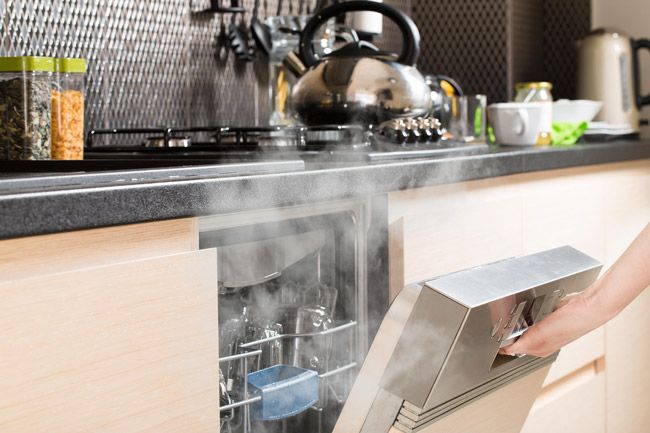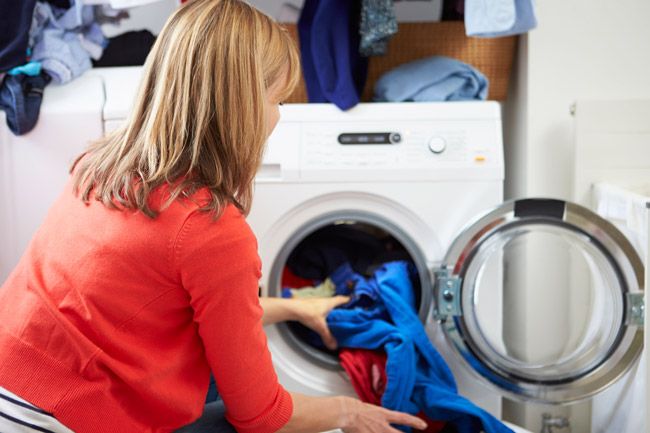As the weather gets colder, many households are switching on the radiators or looking for ways to heat their homes without paying for heating. Electricity prices are still high and you may be conscious of money every time you flick on the kettle or bung another load of washing on. The energy experts at Hometree have crunched the numbers to reveal the household appliances that use the most energy in your home and how to reduce costs…
WATCH: Princess Kate's fear for mothers during the cost-of-living crisis
1. Dishwasher - £1.12 per 90-minute cycle
The average dishwasher cycle lasts around an hour and a half, and running a dishwasher is one of the most expensive household appliances, using around 3.3 kWh of energy.
Only use the dishwasher when it is full to save on costs
There are options for saving on your energy bills when it comes to the washing up. Firstly, invest in a grade A energy-efficient dishwasher. Secondly, make sure to only run the dishwasher when fully loaded.
READ: 20 easiest ways to save money at home each month when you're on a tight budget
2. Washing Machine - 75p per hour cycle
Washing machines and dishwashers account for around 14 per cent of a typical energy bill. On average, a typical washing machine will run from around 45 to 90 minutes.
On an average 2200W washing machine, the appliance will use about 2.2kWh of energy if running for an hour, which will cost around 75p. Again, you should avoid half-loads and opt for a grade A energy-efficiency rating. Some washing machines will have an eco-friendly option, which will use a lower wash and temperature, so less energy is required for heating, therefore costing you less.
3. Fridge and freezer - £3.26 per day
On average, fridges and freezers will account for around 13 per cent of your household’s energy bill, according to Energy Saving Trust. The average fridge/freezer will stay on 24/7, with a wattage of 400, using around 9.6 kWh of energy per day.
REVEALED: 17 best energy saving devices for your home in 2022: How to save money in the long term
There aren’t many options in terms of energy saving, as the nature of a fridge and freezer means they have to stay on all day. However, you can invest in a more energy-efficient one. Every household item will have a grading based on how energy-efficient they are, so look for the ones with Grade A - this will save you money in the long run.
Washing machines cost around 75p per cycle
4. Oven - 34p per 20 minutes
The average wattage of an oven is around 3kW, meaning it uses around 1kwh if run for around 20 minutes, which is about 34p.
Using your oven every day can be a real drain on power, and therefore finances. However, if you do have to use an oven, there are ways to maximise your energy-efficiency. For example, refrain from storing baking trays inside the oven when cooking, as they block the airflow. Also, cleaning your oven regularly helps maintain more effective heat distribution.
A cheaper alternative to an oven would be an air fryer, which is much more energy-efficient than most convection ovens because they cook food much faster.
An air fryer is similar to an oven in the sense that it bakes and roasts. The main difference, however, is that the heating elements are only located on the top and are accompanied by a large, powerful fan. The average air fryer wattage is 1kW, meaning that using an air fryer for around ten minutes would use up to around 0.16kWh of energy. This will cost around 5p on average, making it the most affordable way to cook.
5. Electrical appliances - 10p per hour
From TVs to laptops to game consoles; we are more reliant on consumer electronics than ever, and these take up around 6 per cent of your energy bills, according to Energy Saving Trust.
MAKE A CHANGE: 15 tips to recession-proof your life amid the cost-of-living crisis
A typical 50-inch plasma TV will have a power rating of around 300W, and cost you around 10p an hour to use, using 0.3 kWh. The average laptop with a wattage rating of 50 will also cost you around 2p to use every hour.
Turn your laptop off when not in use
There are things you can do to cut costs when watching TV, such as turning the brightness down slightly, setting a sleep timer, and switching off the plug when not in use.
6. Lighting - 2p per hour
Energy Saving Trust reports that lighting will cost around 5 per cent of the average yearly energy bull. The average lightbulb will cost you around 2p per hour, using up 0.06 kWh of energy. This may not seem like much, but when you have several lightbulbs running all day, the numbers soon add up.
It may seem obvious but making sure to turn your light switches off when not in use can save around £25 a year in energy bills. You can also invest in LED lighting, which is often brighter and more energy efficient. Switching out your incandescent bulb for LED can save you around £15 per light bulb per year.
Like this story? Sign up to our HELLO! newsletters to get other stories like this delivered straight to your inbox.











